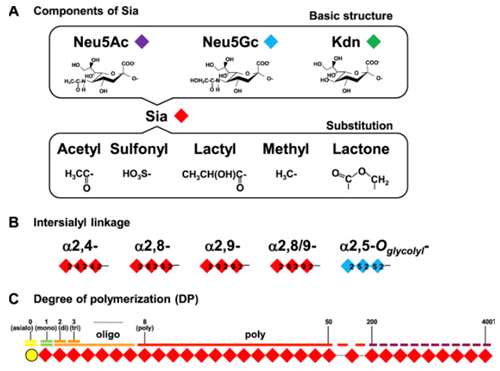Sialic acid is a derivative of a group of neuraminic acids, and polysialic acid (PSA) is a monomer of sialic acid α- 2, 8 or α- 2,9-linked linear homopolymers, which are components of glycoproteins in some mammalian cells and extracellular polysaccharides in a few bacteria. PSA is attached to nerve adhesion molecule (NCAM), to CD36, and to synaptic cell adhesion molecule (SynCAM). It had been reported that polysialylated NCAM is very abundant in embryonic brain, which attracts much attention to numerous disease studies. PSA also plays an important role in cell adhesion, migration and synaptic formation, and in the development and remodeling of nervous system. Naturally PSA is a carbohydrate chain, biodegradable, highly hydrophilic in nature, and has no identified receptor in vivo. Therefore, post-translational modified therapeutic peptides and protein terminal sialic acid can improve the pharmacokinetics of drugs, reduce immunogenicity, and improve their overall efficiency.
 Figure 1. Structures of sialic acid and polysialic acid (Sato C, et al. 2020).
Figure 1. Structures of sialic acid and polysialic acid (Sato C, et al. 2020).
As an alternative of PEG, PSA has more potential application:
With our drug development platform, Profacgen can develop polysialylation modification methods for our customer. If you are interested in our services, please feel free to contact us. We are looking forward to cooperating with you.
Reference
Fill out this form and one of our experts will respond to you within one business day.